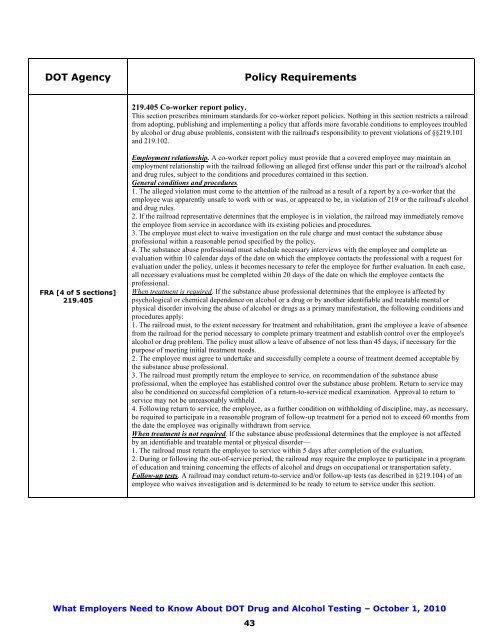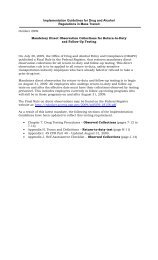What Employers Need To Know About DOT Drug and Alcohol Testing
What Employers Need To Know About DOT Drug and Alcohol Testing
What Employers Need To Know About DOT Drug and Alcohol Testing
You also want an ePaper? Increase the reach of your titles
YUMPU automatically turns print PDFs into web optimized ePapers that Google loves.
<strong>DOT</strong> Agency<br />
FRA [4 of 5 sections]<br />
219.405<br />
Policy Requirements<br />
219.405 Co-worker report policy.<br />
This section prescribes minimum st<strong>and</strong>ards for co-worker report policies. Nothing in this section restricts a railroad<br />
from adopting, publishing <strong>and</strong> implementing a policy that affords more favorable conditions to employees troubled<br />
by alcohol or drug abuse problems, consistent with the railroad's responsibility to prevent violations of §§219.101<br />
<strong>and</strong> 219.102.<br />
Employment relationship. A co-worker report policy must provide that a covered employee may maintain an<br />
employment relationship with the railroad following an alleged first offense under this part or the railroad's alcohol<br />
<strong>and</strong> drug rules, subject to the conditions <strong>and</strong> procedures contained in this section.<br />
General conditions <strong>and</strong> procedures.<br />
1. The alleged violation must come to the attention of the railroad as a result of a report by a co-worker that the<br />
employee was apparently unsafe to work with or was, or appeared to be, in violation of 219 or the railroad's alcohol<br />
<strong>and</strong> drug rules.<br />
2. If the railroad representative determines that the employee is in violation, the railroad may immediately remove<br />
the employee from service in accordance with its existing policies <strong>and</strong> procedures.<br />
3. The employee must elect to waive investigation on the rule charge <strong>and</strong> must contact the substance abuse<br />
professional within a reasonable period specified by the policy.<br />
4. The substance abuse professional must schedule necessary interviews with the employee <strong>and</strong> complete an<br />
evaluation within 10 calendar days of the date on which the employee contacts the professional with a request for<br />
evaluation under the policy, unless it becomes necessary to refer the employee for further evaluation. In each case,<br />
all necessary evaluations must be completed within 20 days of the date on which the employee contacts the<br />
professional.<br />
When treatment is required. If the substance abuse professional determines that the employee is affected by<br />
psychological or chemical dependence on alcohol or a drug or by another identifiable <strong>and</strong> treatable mental or<br />
physical disorder involving the abuse of alcohol or drugs as a primary manifestation, the following conditions <strong>and</strong><br />
procedures apply:<br />
1. The railroad must, to the extent necessary for treatment <strong>and</strong> rehabilitation, grant the employee a leave of absence<br />
from the railroad for the period necessary to complete primary treatment <strong>and</strong> establish control over the employee's<br />
alcohol or drug problem. The policy must allow a leave of absence of not less than 45 days, if necessary for the<br />
purpose of meeting initial treatment needs.<br />
2. The employee must agree to undertake <strong>and</strong> successfully complete a course of treatment deemed acceptable by<br />
the substance abuse professional.<br />
3. The railroad must promptly return the employee to service, on recommendation of the substance abuse<br />
professional, when the employee has established control over the substance abuse problem. Return to service may<br />
also be conditioned on successful completion of a return-to-service medical examination. Approval to return to<br />
service may not be unreasonably withheld.<br />
4. Following return to service, the employee, as a further condition on withholding of discipline, may, as necessary,<br />
be required to participate in a reasonable program of follow-up treatment for a period not to exceed 60 months from<br />
the date the employee was originally withdrawn from service.<br />
When treatment is not required. If the substance abuse professional determines that the employee is not affected<br />
by an identifiable <strong>and</strong> treatable mental or physical disorder—<br />
1. The railroad must return the employee to service within 5 days after completion of the evaluation.<br />
2. During or following the out-of-service period, the railroad may require the employee to participate in a program<br />
of education <strong>and</strong> training concerning the effects of alcohol <strong>and</strong> drugs on occupational or transportation safety.<br />
Follow-up tests. A railroad may conduct return-to-service <strong>and</strong>/or follow-up tests (as described in §219.104) of an<br />
employee who waives investigation <strong>and</strong> is determined to be ready to return to service under this section.<br />
<strong>What</strong> <strong>Employers</strong> <strong>Need</strong> to <strong>Know</strong> <strong>About</strong> <strong>DOT</strong> <strong>Drug</strong> <strong>and</strong> <strong>Alcohol</strong> <strong>Testing</strong> – October 1, 2010<br />
43
















